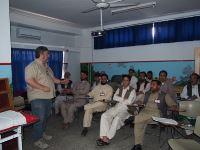 Trainer Dr Paul Ley discusses wound classification with surgeons at the Emergency Hospital in KabulKabul 13 July 2014 – This week Emergency NGO is training 17 surgeons from 13 provinces on trauma care in Kabul, supported by WHO and the European Commission's Humanitarian Aid and Civil Protection Department (ECHO).
Trainer Dr Paul Ley discusses wound classification with surgeons at the Emergency Hospital in KabulKabul 13 July 2014 – This week Emergency NGO is training 17 surgeons from 13 provinces on trauma care in Kabul, supported by WHO and the European Commission's Humanitarian Aid and Civil Protection Department (ECHO).
Overall, 180 general and orthopaedic surgeons will receive training during the eight-month project that aims to build their capacity in mass casualty management and war trauma.
According to the Mid-year Report on Protection of Civilians in Armed Conflict recently published by United Nations Assistance Mission in Afghanistan (UNAMA) and the UN Office of the High Commissioner for Human Rights, the conflict in Afghanistan has taken a dangerous new turn for civilians in 2014.Between 1 January and 30 June 2014, UNAMA documented 4853 civilian casualties, representing a 24% increase from the same period in 2013.
“This training conducted by Emergency is essential here since war trauma has recently increased all over the country due to escalating conflict, especially in these 13 provinces where the trainee surgeons come from,” says Dr Ghulam Rafiqi from WHO Afghanistan.
The two-week training focuses on basic trauma care, covering topics such as primary and secondary surveys, wound classification and surgical management, pre-hospital management and ballistics and war wounds. In addition, the training will enhance the surgeons’ knowledge in blood transfusions, abdominal, head, vascular and chest trauma, airway management and how to properly set up the emergency room.
Despite suffering from decades of conflict, trauma training is new to Afghanistan. “There is not much awareness about the fact that surgery for trauma care can actually be quite cost-effective and not expensive at all,” says Emergency NGO’s trainer, Dr Paul Ley. “Trauma care hasn’t received the emphasis that it really deserves. This kind of training is absolutely mandatory in Afghanistan.”
Although all trainees are experienced surgeons, they acknowledge there is still a need to further develop their skills in trauma care. According to Dr Ley, most hospitals are not adequately organised to administer systematic care to war victims. Hospitals are often lacking readiness plans, and proper preparation and planning for emergencies is minimal. “One important part of this training is imprinting on the surgeons the principles of proper planning and preparedness and how to make the most of your most valuable asset – human resources,” Dr Ley says. The training also emphasises practical learning, utilising on-the-job demonstrations and examinations.
Despite the training being organized during the month of Ramadan, all participants are engaged in the lessons and interested in developing their skills. “Trauma is an everyday experience for us, there are road bombs, suicide bombings and other attacks. It is important for us to gain this information on trauma care since we do not currently have specialized skills. I have found the sessions on fractures and abdomen trauma as well as how to stop bleeding the most useful,” says Dr Yarbaz, a surgeon from Kabul.
WHO will continue to support Emergency, a humanitarian NGO that provides free emergency medical treatment to war victims, in delivering trauma trainings to surgeons in the next three months, and will also expand the project to include five other provinces.


